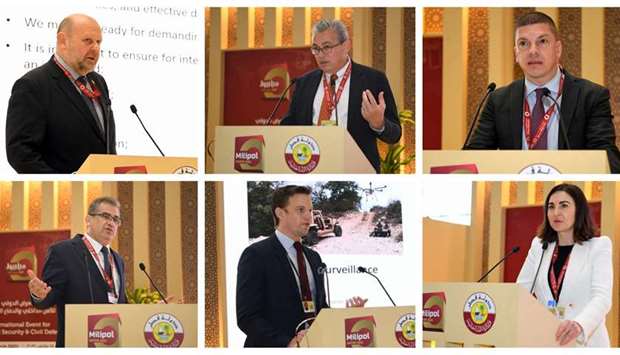A seminar on security management for major events was held on the final day of Milipol Qatar 2021 on Wednesday.
Russell Lewis Robson, who presented a paper on ‘security command and control at major sporting events’, highlighted the importance of managing events through the C4i system, which is a distinguished concept of integrating command, control, co-ordination, communication and information. This system enables the management of sporting events in a complex environment such as organising FIFA 2022 World Cup Qatar events, the Olympics and others.
The paper discussed the challenges, being faced by security authorities during sporting events and there responsibilities that require integrated and joint operations. It also covered the determinants of the event management system and the role of integrated communication systems in the form of the joint operation.
Uliana Barbysheva presented a paper on ‘safety and security aspects of holding sport event during pandemic’. The paper provided a detailed explanation of the security and safety measures adopted by Qatar for the participants in sporting events during the outbreak of Covid-19 as the country hosted a series of local, regional and international sporting events.
The paper reviewed preventive measures taken in the game zones and technical zones during Covid-19 to limit the contact and ensure safety. This included conducting periodic checks for the participants to ensure that they are Covid-free at least every two days as well as maintaining physical distancing as it was allowed to sit on one seat out of every four seats at least as well as applying precautionary measures to the strictness of the physical distancing of the public and wearing a protective medical mask.
Dr Salim al-Bosta spoke on World Cup 2022 stadiums and FIFA fan festival crowd control. The paper dealt with stadium command and control and crowd management aspects, especially during the movement to and from the World Cup stadiums. He said holding associative events at different parts of the country at the same time require prior security plans taking into consideration capacities and infrastructure and adopting strategic strategies for crowd movement.
He explained that the total sites of associated activities and events accompanying the World Cup include about 170 sites pointing out that there work will be at the same time as the matches going on which forces creating a regulatory mechanism for crowds and fans in all regions including Souq Waqif and Katara that are expected to be visited by about 30,000 people during the World Cup. He stressed that controlling crowds during the World Cup is not an easy matter, but rather it needs good planning.
Charles Hubert Dufour presented a paper on ‘rogue drones’ threats in mega events’. The paper shed light on dealing with rogue drone threats in major events and main challenges in this regard. He explained the use of innovative technology based on radiofrequency and electromagnetic jamming to detect, locate and neutralise the rogue drones to enhance safety of the sporting events.
In the fifth paper, Stephen Allcock conducted a comparison between drones and helicopters under the title (security of large public events using tethered drones). He highlighted the advantages of the first in its effectiveness in all its uses, whether civilian or security uses, in monitoring riot phenomena in stadiums and controlling the exit and entry of the public, as it was used in all international sporting events, such as Formula One and others.
It can play an effective role in Qatar with World Cup events as the plane covers a large seating area for 100,000 spectators and a height of 100m in addition to the fact that its operating costs compared to helicopters are very low.
Nadim Abdul Rahim spoke on visualising the data perspective while analysing the threats and challenges facing major sporting events through the perspective of data taken from smart systems. He also discussed how to benefit from this data in the ability to manage crises, including health crises such as the Covid-19. Also, he provided examples of some smart, self-learning systems that can be used in the process of collecting data on the security of major events.

